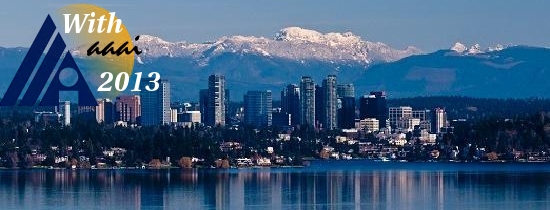RepLearn 2013
Workshop on Learning Rich Representations from Low-Level Sensors
Monday, July 15th, 2013 in Bellevue, Washington, USA.
In conjunction with AAAI 2013.
Motivation and Relevance
A human-level artificially intelligent agent must be able to represent and reason about the world, at some level, in terms of high-level concepts such as entities and relations. The problem of acquiring these rich high-level representations, known as the knowledge acquisition bottleneck, has long been an obstacle for achieving human-level AI. A popular approach to this problem is to handcraft these high-level representations, but this has had limited success. An alternate approach is for rich representations to be learned autonomously from low-level sensor data. Potentially, the latter approach may yield more robust representations, and should rely less on human knowledge-engineering.
Schedule
(PDFs of all accepted papers are available on AAAI's library website.)
08:30-08:45 Workshop introduction and focus
08:45-09:30 Invited talk: Jeff Hawkins
09:35-10:20 Invited talk: Juergen Schmidhuber [talk overview]
10:30-11:00 Coffee Break
11:00-11:45 Invited talk: Benjamin Kuipers
11:45-12:05 Top-Down Abstraction Learning Using Prediction as a Supervisory Signal, Jonathan Mugan [slides]
12:10-12:30 Two Perspectives on Learning Rich Representations from Robot Experience, Joseph Modayil [slides]
12:30-13:30 Lunch
13:30-13:50 Learning Perceptual Causality from Video, Amy Fire and Song-Chun Zhu [slides, poster]
13:50-14:10 Rates for Inductive Learning of Compositional Models, Adrian Barbu, Maria Pavlovskaia, and Song-Chun Zhu [slides]
14:15-14:30 Poster advertisements:
Symbol Acquisition for Task-Level Planning, George Konidaris, Leslie Pack Kaelbling, and Tomas Lozano-Perez
The Construction of Reality in a Cognitive System, Michael S. P. Miller
Events, Interest, Segmentation, Binding and Hierarchy, Richard Rohwer
Learning Behavior Hierarchies via High-Dimensional Sensor Projection, Simon D. Levy, Suraj Bajracharya, and Ross W. Gayler
Building on Deep Learning, Marc Pickett
Autonomous Hierarchical POMDP Planning from Low-Level Sensors, Shawn Squire and Marie desJardins
14:30-15:30 Poster Session
15:30-16:00 Coffee Break
16:00-16:20 Representation Search through Generate and Test, Ashique Rupam Mahmood and Richard S. Sutton
16:25-17:15 Invited talk: Generative Stochastic Networks trainable by Backprop, Yoshua Bengio [slides]
17:20-18:00 Wrap up
Topics
We are interested in all parts of the bridge between low-level-sensors and rich high-level representations and their use in reasoning tasks. This includes but is not limited to:
Invited Speakers
- Yoshua Bengio, University of Montreal
- Jeff Hawkins, Numenta Inc.
- Benjamin Kuipers, University of Michigan
- Juergen Schmidhuber, Dalle Molle Institute for AI
Organizing Committee
- Marc Pickett, Naval Research Laboratory contact
- Benjamin Kuipers, University of Michigan
- Yann LeCun, New York University
- Clayton Morrison, University of Arizona
Program Committee
- David Crandall, Indiana University
- Joseph Modayil, University of Alberta
- James MacGlashan, Brown University
- Clayton Morrison, University of Arizona
- Jonathan Mugan, 21 CT
- Tim Oates, University of Maryland Baltimore County
- Marc Pickett, Naval Research Laboratory
